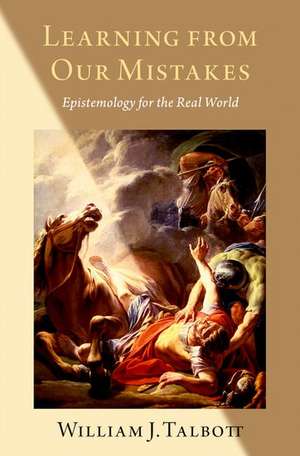Learning from Our Mistakes: Epistemology for the Real World
Autor William J. Talbotten Limba Engleză Hardback – 21 noi 2021
Preț: 559.55 lei
Preț vechi: 639.35 lei
-12% Nou
Puncte Express: 839
Preț estimativ în valută:
107.10€ • 116.38$ • 90.03£
107.10€ • 116.38$ • 90.03£
Carte disponibilă
Livrare economică 20-26 martie
Preluare comenzi: 021 569.72.76
Specificații
ISBN-13: 9780197567654
ISBN-10: 0197567657
Pagini: 368
Dimensiuni: 241 x 163 x 33 mm
Greutate: 0.64 kg
Editura: Oxford University Press
Colecția OUP USA
Locul publicării:New York, United States
ISBN-10: 0197567657
Pagini: 368
Dimensiuni: 241 x 163 x 33 mm
Greutate: 0.64 kg
Editura: Oxford University Press
Colecția OUP USA
Locul publicării:New York, United States
Recenzii
In this brilliantly conceived volume, William Talbott takes aim at the 'Proof Paradigm', composed of five erroneous principles, which as he sees it has dominated Western epistemology since the ancient Greeks, and proposes to replace it with a superior alternative, one that involves on his part daring speculation about the metaphysical necessity of the principles of proper reasoning... Talbott's impressive book abounds with original ideas that, I am glad to say, are expressed with clarity and as much simplicity as the subject allows.
[T]he positive account . . . is intuitive and elegantly constructed.. . . [T]he book offers rich rewards. . . . Recommended. Upper-division undergraduates through faculty.
William Talbott offers a fundamentally new way of thinking about epistemic rationality, one that seems to me to constitute a third alternative to the ultimately frustrating demands of traditional internalism (growing out of what he describes as the "proof paradigm") and the sterile and unsatisfying externalist approach. On Talbott's view, the essence of epistemic rationality, rather than proof from unassailable premises or mere third-person evaluation, is the capacity to rationally correct one's own mistakes. Developing and elaborating this idea yields many rich insights into both the history of western epistemology and a wide range of issues, both epistemological and topical. It seems to me to offer a real and urgently needed antidote to the cognitive and epistemological chaos that presently afflicts our society.
This is a strikingly original book... Talbott has insightful things to say about the nature of prejudice, the faults with Bayesian approaches to rationality, the significance of self-undermining theories, the epistemological significance of higher-order belief, the role of experience in rationality, the importance of necessity and universality in a theory of rationality, and much more besides. Every epistemologist should read this book.
Talbott's sophisticated theory of rationality is wide-ranging and innovative, and should interest any serious epistemologist.
[T]he positive account . . . is intuitive and elegantly constructed.. . . [T]he book offers rich rewards. . . . Recommended. Upper-division undergraduates through faculty.
William Talbott offers a fundamentally new way of thinking about epistemic rationality, one that seems to me to constitute a third alternative to the ultimately frustrating demands of traditional internalism (growing out of what he describes as the "proof paradigm") and the sterile and unsatisfying externalist approach. On Talbott's view, the essence of epistemic rationality, rather than proof from unassailable premises or mere third-person evaluation, is the capacity to rationally correct one's own mistakes. Developing and elaborating this idea yields many rich insights into both the history of western epistemology and a wide range of issues, both epistemological and topical. It seems to me to offer a real and urgently needed antidote to the cognitive and epistemological chaos that presently afflicts our society.
This is a strikingly original book... Talbott has insightful things to say about the nature of prejudice, the faults with Bayesian approaches to rationality, the significance of self-undermining theories, the epistemological significance of higher-order belief, the role of experience in rationality, the importance of necessity and universality in a theory of rationality, and much more besides. Every epistemologist should read this book.
Talbott's sophisticated theory of rationality is wide-ranging and innovative, and should interest any serious epistemologist.
Notă biografică
William J. Talbott is a Professor of Philosophy at the University of Washington, Seattle. He teaches and has published articles in epistemology; moral and political philosophy, including the philosophy of human rights; rational choice theory; and the philosophy of law. He is the author of a book on reliabilist epistemology, The Reliability of the Cognitive Mechanism and two books in the philosophy of human rights: Which Rights Should Be Universal? and Human Rights and Human Well-Being (both OUP).
